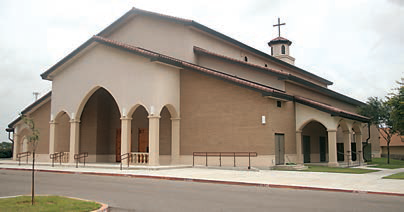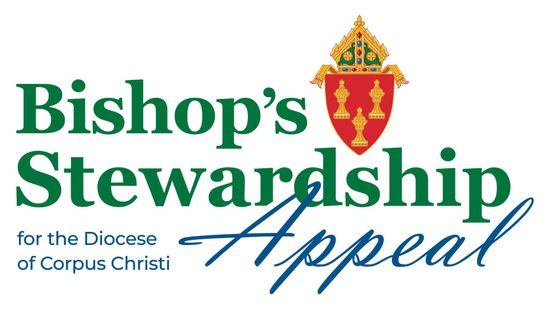16602 FM 624, Robstown TX 78380 | (361) 387-1312 or (361) 387-7842
FAX (361) 387-9311

St. Thomas the Apostle Parish
and St. Patrick Mission
Welcomes You
Mass Times
St. Patrick Mission:
Saturday Vigil @ 4:00 p.m.
St. Thomas the Apostle:
Saturday Vigil @ 5:30 p.m.
Sunday Masses
@ 8:30 a.m. & 11:00 a.m.
Confession: By Appointment &
30 Minutes before Holy Mass
ST THOMAS the APOSTLE
WEEKDAY MASSES
MONDAY: No Mass
TUESDAY: 12:00 noon
WEDNESDAY: 12:00 noon
THURSDAY: 12:00 noon
(Holy Rosary 11:40 a.m.)
FRIDAY: 12:00 noon
(Divine Mercy 11:45 a.m.)
Parish Office Hours:
Monday, Wednesday, Friday 8:00 a.m. - 11:00 a.m.
Tuesday & Thursday 8:30 a.m. - 11:30 a.m. and 1:00 p.m. - 4:00 p.m.
Message from the desk of the Pastor:

God speaks to us in many ways, including through the Sunday Scripture readings.
The Sunday Connection from Loyola Press provides useful background and activities to better understand the upcoming Sunday's Scripture readings, helping you to connect the Scripture to daily life in a meaningful way.
THE FOURTH SUNDAY OF LENT
Sunday, March 30, 2025
Gospel Reading
Luke 15:1-3, 11-32
Jesus teaches about forgiveness in the parable of the Prodigal Son.
Background on the Gospel Reading
The parable Jesus tells in today's Gospel is unique to the Gospel of Luke. Jesus has been teaching the crowds as he journeys to Jerusalem. As he teaches, the Pharisees and scribes complain and challenge Jesus because he is welcoming sinners at his table. Today we hear the third of three parables that Jesus tells in response to his critics. These three familiar parables—the lost sheep, the lost coin, and today's parable of the prodigal son—invite us to consider the depth of God's mercy and love.
The Pharisees taught a scrupulous observance of Jewish Law. In their interpretation and practice, observant Jews who shared table fellowship with sinners would be made unclean. Like Jesus, the Pharisees hoped to lead sinners back to God. The Pharisees, however, required that sinners first become ritually clean—observant of the Pharisees' interpretation of Jewish Law—before sharing table fellowship. This appears to be one of the major differences between the Pharisees and Jesus. Jesus reaches out to sinners while they are still sinners, inviting them to conversion through fellowship with him. Jesus is God acting among us; by befriending us, he is inviting us to return to friendship with God. Through friendship with Jesus, our sins are forgiven and we, in turn, bear fruit for God. Recall last Sunday's Gospel and the barren fig tree.
Our familiarity with today's parable risks dulling us to its tremendously powerful message. We call this the parable of the lost son or the prodigal son. Any focus on the younger son, however, must also be balanced by an examination of the unusual behavior of the father.
First we must imagine our first response to the audacity of a son who asks for his inheritance before his father has died. Indignation would certainly be a justifiable response to such a request. Yet the father in this parable agrees to honor the son's request and divides his property among his two sons. How might we describe such a father? Foolish comes to mind, but so does trusting. Without property of his own, the father must rely upon his sons to provide for his well-being.
The younger son takes his inheritance and leaves home. The older son remains, continuing to provide for the father and the household. Having been disgraced by the younger son, the father spends some time watching the road for the return of the lost son. When he eventually sees his wayward son returning, the father not only welcomes him but also runs out to greet him and then honors him with a party. We say that this father is loving and forgiving. Yet these adjectives only begin to describe the depth of love and mercy that characterize the father.
We find no surprise in the anger of the older son. Yet the father appears sad and even confused by the older son's indignation. He says in reply that they should celebrate because the lost son had returned. The father is filled with gratitude and love for the older son's faithfulness. This love is in no way diminished by the father's rejoicing at the return of the younger son. Yet the older son's jealousy reveals his limited understanding of the depth of his father's love.
The Fourth Sunday of Lent is traditionally called Laetare Sunday. Laetare is a Latin word that means “rejoice.” Today's Gospel describes the reason for our joy: God's great love for us has been revealed in Jesus. Through his Passion, Death, and Resurrection, Christ has reconciled us with God and one another.
Family Connection
“Hey, that's not fair!” How many times have we heard this spoken in our family? Family members challenge one another's generosity, operating from the perspective of limited resources. If we have given to one, perhaps there won't be enough for the other. Jesus wants us to understand that this is not how it is with God's mercy and forgiveness. God offers his love to all of us in abundance. The forgiveness of the father in the parable is an image of God's love for us, generous beyond measure in his love for both of his sons. Can we truly believe that God acts this way towards us and accept his mercy without jealousy, knowing that God's love for another does not diminish his love for us?
As you gather as a family, talk about the words and phrases you speak to one another when angry. Identify words or phrases that reflect jealousy towards one another. Talk about why we sometimes feel jealousy towards one another. Read aloud today's Gospel, Luke 15:1-3,11-32. Talk about why the older brother is jealous of the younger brother. Identify words that the family members in the parable might say to one another to begin to heal their broken relationships. Make a family commitment to say these types of words and phrases to one another with greater frequency. Pray together the Lord's Prayer.

And Jesus came and said to them, "All authority in heaven and on earth has been given to me. Go therefore and make disciples of all nations, baptizing them in the name of the Father and of the Son and of the Holy Spirit, teaching them to observe all that I have commanded you; and lo, I am with you always, to the close of the age."
Matthew 28: 18-20 (RSV-CE)
Button
Give online to the work of the church
Parish Office Hours:
Monday, Wednesday, Friday 8:00 a.m. - 11:00 a.m.
Tuesday & Thursday 8:30 a.m. - 11:30 a.m. and 1:00 p.m. - 4:00 p.m.











